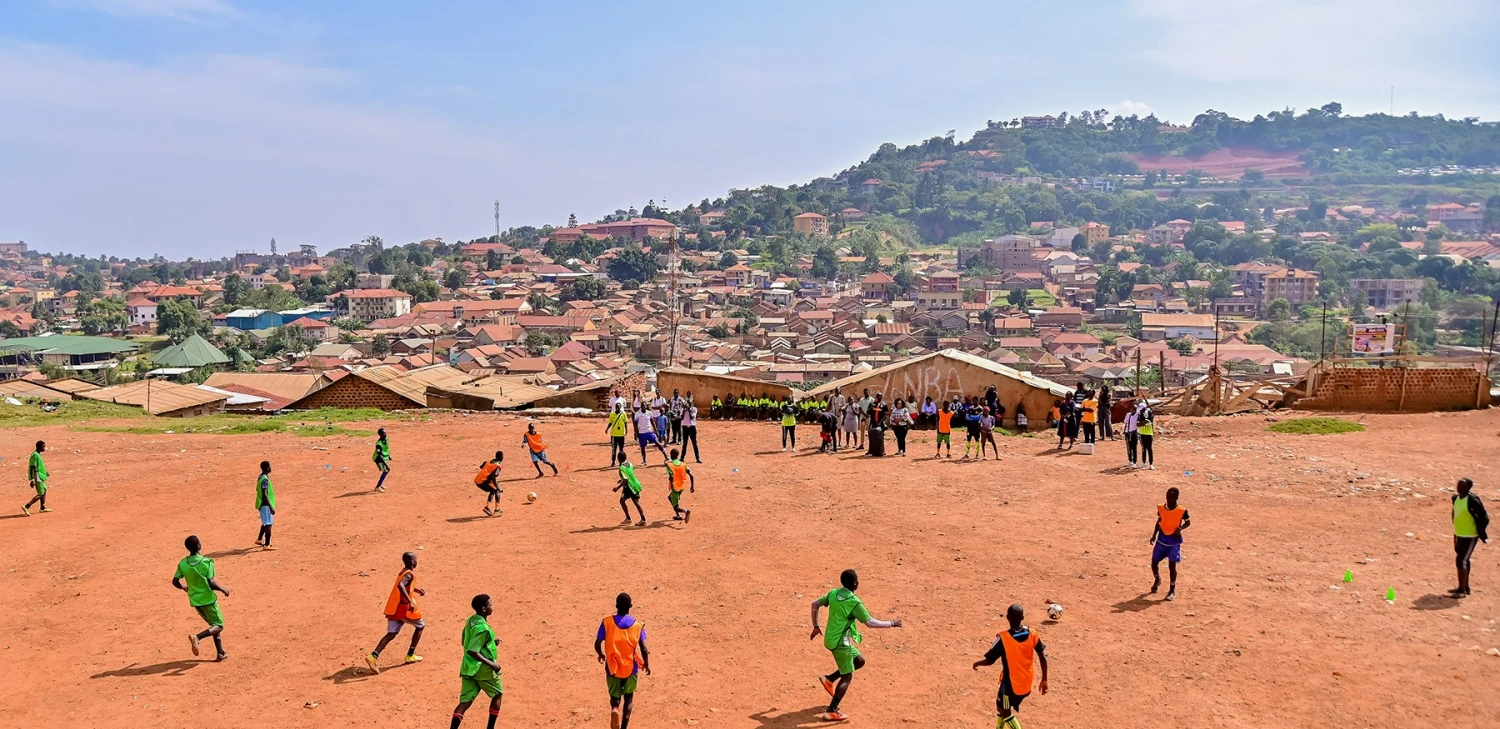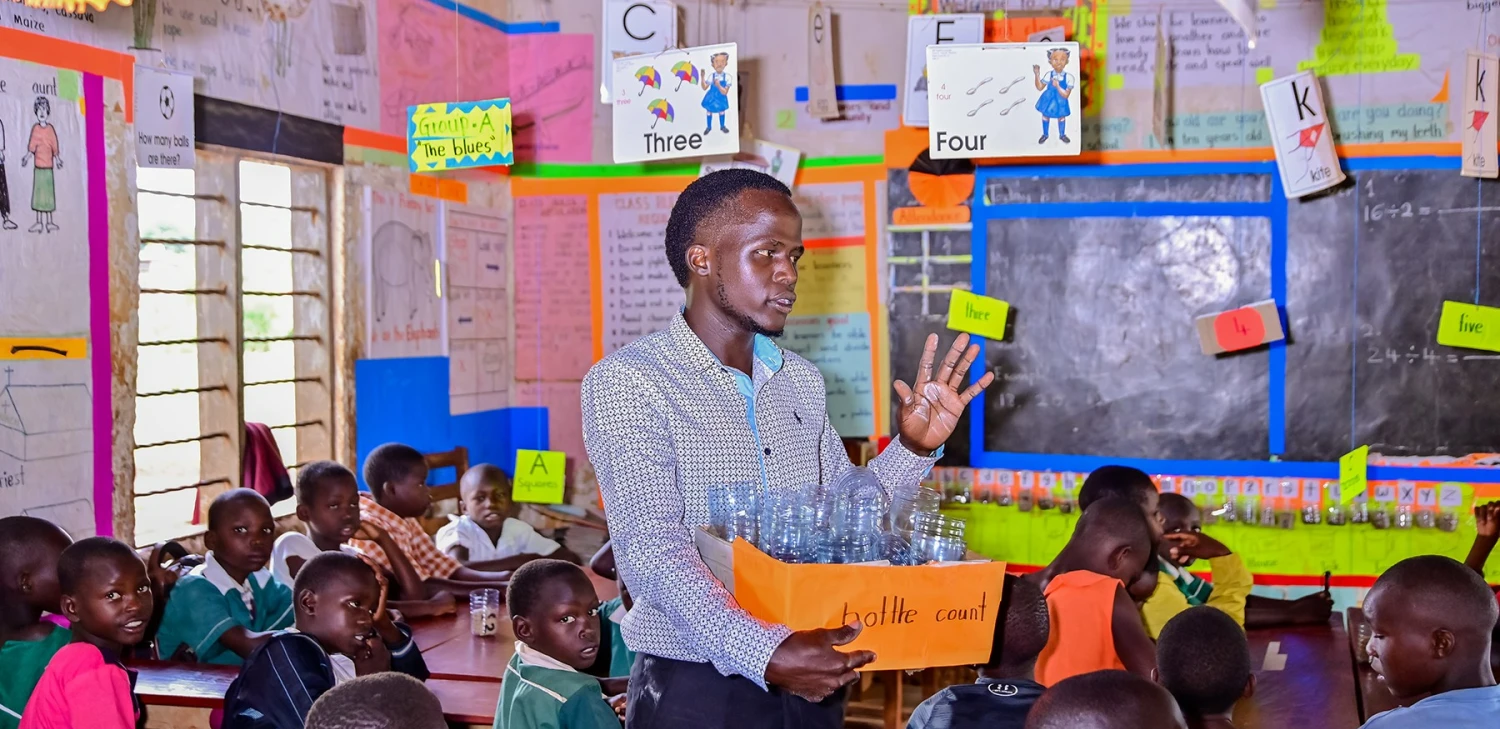Recently, the Audemars Piguet Foundations travelled to Uganda to meet with Right To Play and Teach For Uganda. Active in the field of education, both NGOs work to improve the prospects of children and young people in vulnerable situations.
The Audemars Piguet Foundations work to promote the environment, social equity and education. In addition to providing financial support to non-profit organisations in this context, they also identify beneficiaries for the funds raised by Audemars Piguet’s charity auctions. Recently, two members of the Foundations team travelled to Uganda to meet, among others, with Right To Play and Teach For Uganda: two organisations that are supported by Audemars Piguet and the Audemars Piguet Foundation for Common Good respectively. Both NGOs work to improve the prospects of children and young people in vulnerable situations. Their impact depends on the commitment of stakeholders on the ground and passionate programme managers who are determined to take tangible action to support the young people of Uganda.
The challenges of education in a young and multicultural society
Straddling the equator in East Africa, Uganda is part of the African Great Lakes region. The country is divided into 146 districts spread across four main geographic areas (Northern, Eastern, Western and Central). Its population is made up of some forty distinct ethnicities, each with its own dialect. Thus, although the country’s current official languages are English and secondarily Kiswahili, most Ugandans don’t speak them fluently.
In addition to its incredible diversity, Uganda’s population is also characterised by its youth. The country has one of the highest birthrates in the world and counts almost 36 million people under 30, i.e. approximately 77% of its population of nearly 47 million.
Due to this demographic phenomenon, Uganda faces significant challenges in terms of education and economic opportunities. Despite being an invaluable asset, ethnic diversity can sometimes exacerbate these obstacles.
In spite of government efforts, the education infrastructure is struggling to keep up with births. Access to quality education is limited, especially in rural areas, where school drop-out rates remain very high, often justified on socio-economic grounds.
Revealing the potential of young people through play
Right To Play is an international non-profit organisation whose mission is to protect, educate and strengthen the autonomy of children and young people in vulnerable situations. Its work focuses on play-based learning, which is an active and experiential method. Each year, Right To Play trains and supports over two million teachers, trainers and community coaches in 15 countries to allow them to incorporate play-based learning into their lessons. This helps children and young people to develop social, emotional, cognitive and physical skills, improving their autonomy and their ability to learn. Parents and healthcare professionals also receive support to encourage children’s learning. Through this approach, Right To Play has a significant impact on young people’s lives across four main focus areas: quality education, empowerment of girls, child protection, and health and wellbeing.
In Uganda, where Right To Play has been present since 2001, the charity has developed five programmes across these focus areas. Two of them, Play To Grow and Tusobola Project, have received a donation from Audemars Piguet, funded by the proceeds from the auction of a one-off watch created in collaboration with American designer Matthew Williams and his brand 1017 ALYX 9SM. These initiatives were put forward by the Audemars Piguet Foundations, which help select NGOs to benefit from these types of donations and ensure the long-term monitoring of the projects funded.
The Play To Grow initiative focuses on parent education, with an emphasis on early learning at home to support the overall and academic development of skills. It includes home visits by parent education facilitators, and psychosocial support groups for parents. In Uganda, parents trained in reactive parenting noticed an improvement in their children’s behaviour and social and emotional skills, with rates rising from 21% to 46% in six months.
Tusobola Project aims to promote the learning of young people in vulnerable situations in a post-pandemic context. In particular, the aim is to give them a high-quality education with results that include a health component. This allowed pupils at St Jude’s primary school on Naguru Hill, to the east of Kampala, to take part in a series of educational activities implemented and overseen by Right To Play. Girls’ and boys’ clubs explore topics such as entrepreneurship, hygiene, gender and environmental protection, which are always approached through play. Recycling is also promoted through a community vegetable garden tended by teachers and pupils. These fun learning activities, which raise young people’s awareness of various key themes, also help to create vital connections with adults. These relationships encourage discussion and, as a result, the resolution of the issues that affect young people and lead to absenteeism or dropping out of school.
Right To Play enjoys a partnership with the Ugandan Ministry of Education and Sports, which facilitates its work in schools. From its launch in April 2023 to December 2025, Tusobola Project is expected to benefit 4,300 pupils and 60 teachers, as well as 1,400 out-of-school young people and 40 volunteer coaches.
The latter play an essential role in helping Right To Play to achieve its objectives. They often come from the communities they support and are therefore familiar with the environment in which they work and the issues they face. In Kinawataka, one of Kampala’s largest slums, the coaches with whom the charity works (and who it trains) belong to a local community group: the Christian Youth Missionary Group Kinawataka (CYMGK). Composed of 34 members, it coordinates several practical and behavioural training activities developed in partnership with Right To Play to respond to the difficulties faced by young people in the neighbourhood. These problems include inadequate waste and sanitation management and poor hygiene, as well as issues such as high crime rates and the prevalence of teenage pregnancy.
Sport plays a leading role in the activities on offer. Young people are taught positive discipline, for example, during football matches, which offer an ideal scenario for instilling values such as mutual respect, encouragement, communication, cooperation and conflict resolution. The positivity and community spirit that come from play are vital in a context such as that of Kinawataka. They help build resilience in young people by giving them the tools they need to overcome adversity and by helping them envision a better future.
Training the education and community leaders of the future
Teach For Uganda, which has been financially supported by the Audemars Piguet Foundation for Common Good since 2024 for a period of three years, is also working to ensure a prosperous future for the country’s young people. The NGO’s mission is to train recent university graduates from a variety of courses (known as "fellows") to become dedicated teachers and leaders in communities where access to quality education is limited. The fellows join a two-year training programme during which they commit to teaching at disadvantaged schools, often situated in rural areas. Under the supervision of a coach from Teach For Uganda, they work in tandem with experienced teachers. These duos are mutually beneficial: the fellows ease the workload of the teachers – whose classes sometimes have more than one hundred pupils – and the teachers in turn pass on their knowledge to the recent graduates.
Barbara, Charles, Dorah, Maureen and Willy are about to complete the two-year training programme that took them to Kayunga, 75km north-east of Kampala. Their diverse academic backgrounds didn’t lend themselves to entering the education system. However, all of them except Willy now want to continue their careers in teaching. In addition to the knowledge and skills they have gained through Teach For Uganda, these fellows have found a true calling, amplified by the impact they have had on schools and communities during their placements.
Dorah and Willy teach at the Nabunganyi Church of Uganda primary school, which has 638 pupils enrolled and nine teachers. Since the fellows arrived, attendance at the school has increased significantly – a source of pride for Willy: "There were 48 children in my class when I arrived. Now there are almost a hundred." The Kayunga fellows have launched a number of projects to remove barriers to school attendance. "Food was a massive challenge," says Willy. "Some children don’t eat all day, and come back to school the next day still having eaten nothing. It’s difficult for them to concentrate and take part in activities in these conditions." At the instigation of Dorah and Willy, and with the approval and support of the headteacher, the pupils’ parents and the community as a whole, maize was planted on the school grounds. This is used to make porridge for the children’s lunch and to provide them with food to take home for the evening.
The fellows also organised football tournaments in Kayunga to encourage children to attend school. "We’ve seen a 90% fall in absenteeism and a 40% drop in inappropriate behaviour thanks to football," says Charles. "Football is an incredible tool for teaching children respect and cooperation." Willy, who plans to set up a social enterprise to get girls involved in sport, went even further by opening up the tournaments to girls who are not in education.
The fellows have a fascinating presence in the classroom and are able to capture the pupils’ attention. The teaching methods used are dynamic and participatory, focusing on interaction and kindness. The children are encouraged to express themselves through different forms of congratulations: rhythmic applause, hand movements simulating flower throwing, and slogans are used to celebrate pupils’ contributions.
The Teach For Uganda fellows show the same kindness and solidarity to each other. "We’re a family," says Maureen. "We often see each other outside of school and we help each other, sometimes even financially. Together we think about the problems we’ve encountered and combine our efforts to find solutions. It’s all about teamwork!"
The headteacher of Nabunganyi Church of Uganda primary school says that the fellows’ assistance has been fantastic. He is delighted with the progress that his pupils have made and all the systemic changes he has seen at community level. The Teach For Uganda fellows are much more than "just" teachers; they are true community leaders whose involvement has a direct positive impact on the daily lives of young people and their future prospects.

